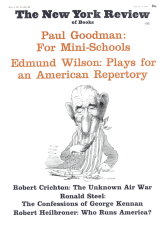In response to:
Self-Reliance from the November 9, 1967 issue
To the Editors:
A few correctives to the melancholy analytic powers exhibited in Philippa Foot’s review of Hazel Barnes’s An Existentialist Ethics [NYR, November 9]:
(1) Miss Foot writes: “…what if I recognize that other people are free beings but choose to treat them as I treat things…? Now it is Miss Foot who chose to speak of Sartre in a review of Barnes, but if she had read him closer, she would know that it is impossible to treat a free being as a thing and yet be in good faith with oneself. This would seem to accord with most people’s ideas of good and bad faith as well.
(2) I cannot see where the subjective feeling of angoisse which accompanies liberty is worth devoting that much ink to if it eventuates in a choice which is authentic. If Miss Foot does not experience it, so much the better for her night’s rest.
(3) It is difficult to see where Miss Foot has proved that Sartre’s philosophy is “…haunted by the authority he denies.” This sounds like the weak reproaches addressed to Sartre by Mauriac et al. How can one attack a concept like God without mentioning him often? And to the question: What idea other than God could give meaning to the thought that there is one proper system of norms governing choice? One could certainly array more than the parsimonious single offering of Miss Foot: how about the state, tradition, or any of our prevailing ideologies?
(4) Finally, why tax Sartre for a 1943 work which he has surpassed? We accord some ironic truth to the dictum: Habent sua fata libelli; but the rest of that goes: pro capite lectoris. As this review demonstrates, Sartre has suffered from both sides of the expression.
Kenneth Lawrence
University of Wisconsin
Madison, Wisconsin
Philippa Foot replies:
Professor Lawrence says that if I had read Sartre more closely I would know that one cannot both be in good faith and treat other people as things by disregarding their interests and rights. But he must show not just say that the arguments I was challenging are valid after all. The history of philosophy is littered with unsucessful attempts to link injustice with some kind of falsity, or other disorder, in the soul. Existentialists, and their defenders, seem curiously unaware of the difficulty of the task.
As to angoisse. Professor Lawrence would like to see it as a merely personal reaction to the freedom to choose our own lives. He must, however, know that Sartre believed the man of good faith necessarily to apprehend his freedom in angoisse. And this is relevant to my suggestion that Sartre was haunted by the authority he denied. For angoisse makes sense as the necessary accompaniment of choice-in-good-faith either if there is a question of usurping authority, or if there is a dread of wrong choice. My suggestion is that when we genuinely leave behind the idea of an authority we no longer have so much as a thought of an ultimate right or wrong in the choice of lives. From a moral point of view certain things are good and bad, but from an aesthetic point of view other values prevail, and from the point of view of self-interest yet others again. We do not have to let one kind of consideration or another weigh with us, and to say that we “should” or that it “is good” if we do is an empty form of words. Sartre speaks as if we can think of an ultimate value as belonging to this life rather than that, though we must create this value for ourselves (whatever exactly that can mean). Hence he implies an authority which he also denies. Of course other people have been haunted too, and no doubt the ghost takes different forms.
Those who can translate Latin will understand that modesty forbids me to reply to paragraph 4. But at the risk of confirming Professor Lawrence’s low opinion of me I would gently suggest that in this paragraph he is simply a) showing off and b) letting off steam. He cannot seriously mean that we should ignore l’Etre et le Néant because it was published in 1943.
This Issue
January 4, 1968



